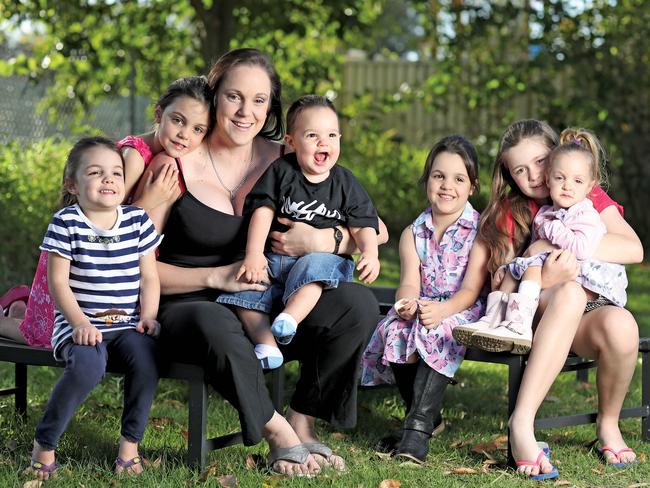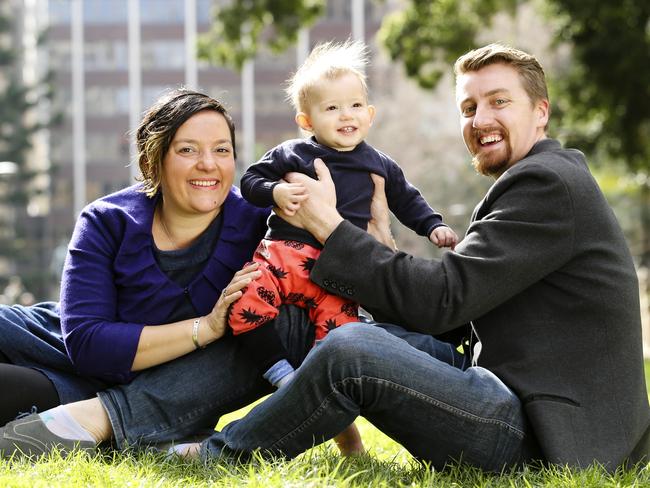Is a voucher for Botox or an online dating subscription a thoughtful gesture – or a thinly veiled insult?
THE self-improvement gift is fraught with danger: at its best it’s life-changing, but at its worst it could be relationship-ending.

Stellar
Don't miss out on the headlines from Stellar. Followed categories will be added to My News.
PAMELA Noon, who was a TV presenter in the 1980s, now runs a thriving cosmetic and plastic-surgery business.
One of her more popular products are her gift vouchers; she sells about 100 a year. Usually, it’s men buying Botox treatments or breast implants for their wives or girlfriends (demand is strong in the lead-up to Mother’s Day), and occasionally it’s girlfriends buying for friends, or bosses for their secretaries.
The most expensive voucher Noon has ever sold was worth $22,000. The recipient, Gold Coast woman Krystale Armao, had seven children by the time she was 32, and each one took a bigger toll on her body. The birth of baby number seven was a stressful time for her, too; she nearly bled to death in childbirth, and then her father died a few weeks later. So when her son was four weeks old, her husband decided to cheer her up. He sat her down and presented her with an envelope.
Inside was a voucher for a tummy tuck and breast enhancement. “Some people might think their husband was not happy with the way they look, but I was over the moon,” says Armao.
“It’s a life-changing gift to be able to transform your body. It gives women back something they would have lost a long time ago. I looked amazing [after the surgery] – I still feel amazing.”

Once upon a time we would have given our loved ones a massage voucher, a scented candle or perhaps a ride in a hot-air balloon.
But in this age of self-improvement, we are turning birthday or Christmas gifts into an opportunity to improve other people, too, with cosmetic surgery, a life-coaching session or a gym pass. There is, however, an edge to this new type of present. Despite the best of intentions, we might be gifting an insult, as well.
It pivots on perspective; is Botox a generous present, or a hint about a furrow? Is the mother who offers to pay to freeze her daughter’s eggs liberating her from her biological clock, or lacking confidence in her ability to find a mate? The self-improvement gift is fraught with danger: at its best it’s life-changing, but at its worst it’s relationship-ending.
While men might give women gifts to improve their appearance, women are more likely to give men gifts aimed at improving their lives.

Noon has never sold a cosmetic enhancement gift for a man, but Chris Edwards, a Canberra-based life coach, often sells vouchers to a mother buying for her son, or a wife buying for her husband.
“In these situations there are relationship issues, and she wants to deal with them in a way that’s not so confrontational,” he says. “Rather than saying to them, ‘You are not doing this,’ or, ‘I think you are having an affair,’ some of the more astute ones would buy a gift voucher. I work with the husband – assuming he is happy to do that. Coaching works best when the person is willing to be coached.
“I just finished a six-month contract with a guy whose de facto bought it for him. He was having issues with his ex and she wanted him to sort them out.”
The self-improvement gift is fraught with danger: at its best it’s life-changing, but at its worst it’s relationship-ending.
The popularity of such gifts has grown, says social commentator Mark McCrindle, from a collision between three trends: the millennial generation’s preference for experiences over things; the resurgent popularity of the personal-development movement; and the increasing lack of embarrassment when it comes to issues of vanity.
“The less awkward end of this trend is the voucher for a cooking course or a mindfulness colouring-in book,” says McCrindle. “But it is still an area where people ought to tread carefully. It is often an unwanted entry into someone’s life to make a suggestion, or offer a solution uninvited. When that gift comes, whether it be a gym voucher or laser hair removal, people ask the question: ‘Do you think I need this?’”
The more brazen of these gift-givers might answer: “Yes”.

Sydney woman Mel Marshan’s grandmother had firm ideas of what her then 28-year-old single granddaughter needed, so seven years ago she decided to help her get it.
Under the Christmas tree was a card addressed to her granddaughter – a surprise in itself as she wasn’t usually a gift-giver. Inside was the message: “For your future, have a chat to me.”
Curious, Marshan sought out her grandmother, who handed her money to buy an online dating subscription. “She had seen an advertisement for [dating site] eHarmony on television,” says Marshan. “She thought the man on the ad was quite good-looking, so maybe I could find someone ‘suitable’ online.”
The not-so-subtle subtext, of course, was that her grandmother felt the men Marshan was meeting were not suitable. “Look, none of them were the type I would settle down with, but I didn’t want to get married and have kids,” she says. Marshan laughed off the gift with her cousins that day, and understood her elderly grandmother’s motivation. “She obviously truly believed that I needed to be married and have kids, and she just wanted me to be happy.”
Marshan had no intention of using the gift. But a month or so later she was procrastinating while working on her thesis and had a look at the site. She signed up, for something to do, and began messaging a man called Aaron Powell.
Now, seven years later, she and Powell are married and they have a one-year-old son, Reuben. “My grandmother passed away four and a half years ago, but she was absolutely smitten with Aaron,” says Marshan.
“I have even seen [vouchers for] manicures taken the wrong way – ‘What are you saying about my hands?’”
The central issue, says psychologist Jo Lamble, is context. Grandmothers, with their quaint, old-fashioned ideas, might be distant enough to get away with gifts that a parent, whose judgement hits closer to the heart, might not.

Similarly, giving a Botox voucher to an intimate partner who has been wanting it for years is far less risky than giving it to someone who has never expressed any desire for it at all, while a life-coaching voucher might be fine for a partner who realises they have a problem, but insulting for one who doesn’t.
And “improvement” gifts for one’s less-intimate friends or even employees, as in the case of an IT manager who bought $3000 worth of vouchers from Noon for his two secretaries, is probably the riskiest option of all.
“If in doubt, don’t,” says Lamble. “If your partner, or whoever you are giving it to, has said, ‘I am so lost, I have no idea what I am going to do,’ then something like a life-coaching voucher might be a thoughtful gift. But if the person you are giving it to is happy just being a surf bum, then it’s a signal you don’t approve of what they are doing.
“I have even seen [vouchers for] pedicures and manicures taken the wrong way – ‘What are you saying about my hands?’ If the other person would kill for Botox but can’t afford it, then maybe it’s the right gift. But if it’s unsolicited, just don’t.”
Some of those who receive Noon’s vouchers never claim them, but she says she has really only seen one gift backfire. “The husband came in before Christmas and said his wife had always wanted her breasts done,” she says. “She came in for her consult, but it turns out that she didn’t want to get her breasts done at all. It was a sad thing. He didn’t know his wife as well as he thought he did.”
Originally published as Is a voucher for Botox or an online dating subscription a thoughtful gesture – or a thinly veiled insult?


